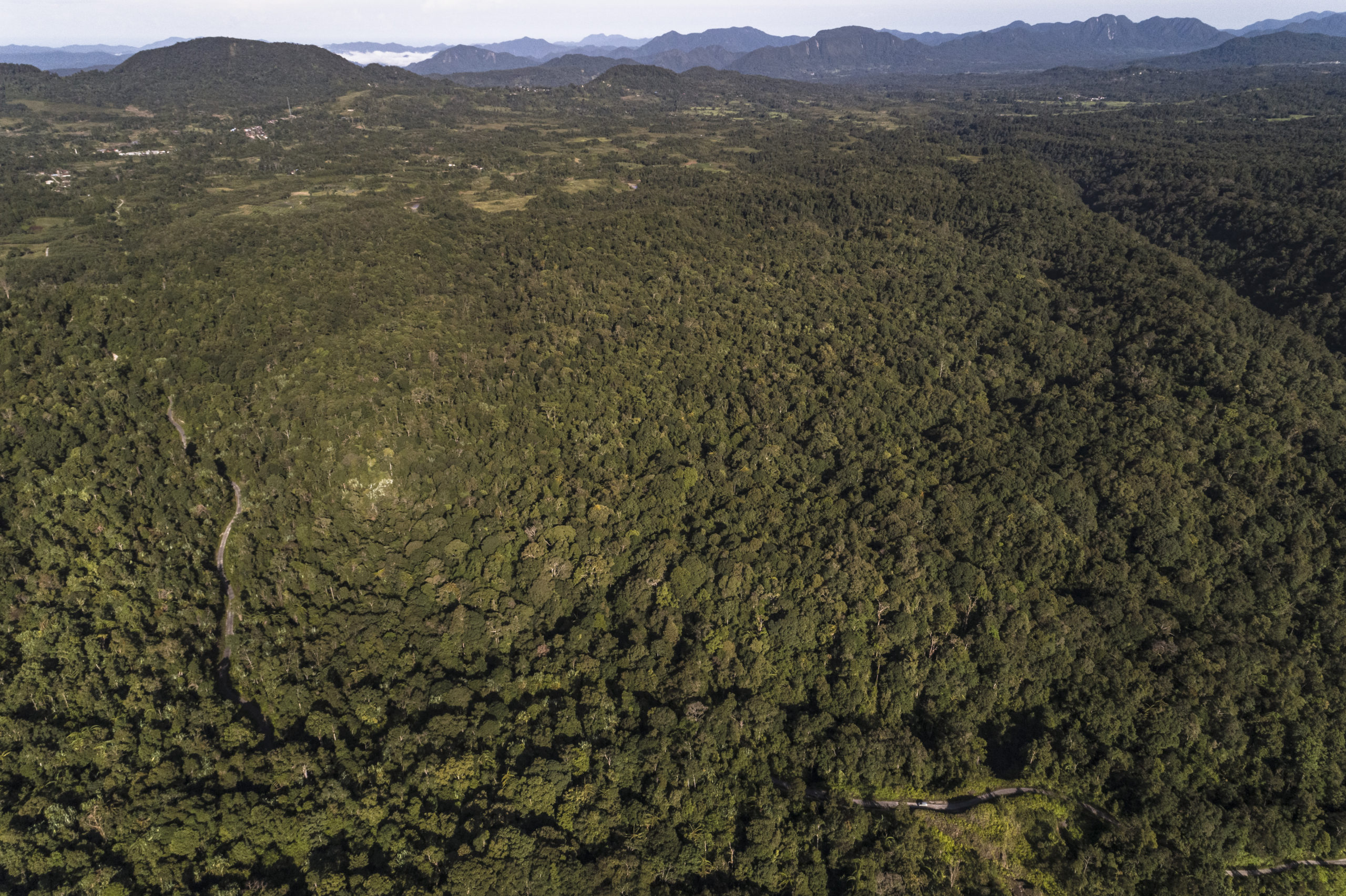Chances are you’ve been following the important fight to stop Line 3 and stand in solidarity with the Anishinaabe peoples. As you know, the fight for Indigenous land and sovereignty is not unique to the US. Halfway across the world, in Indonesia, Indigenous Batak Toba peoples and the forests they depend on are under attack by big agribusiness.
Here’s what’s happening and why supporting the fight for Indigenous land is one of the most effective ways to combat climate change.
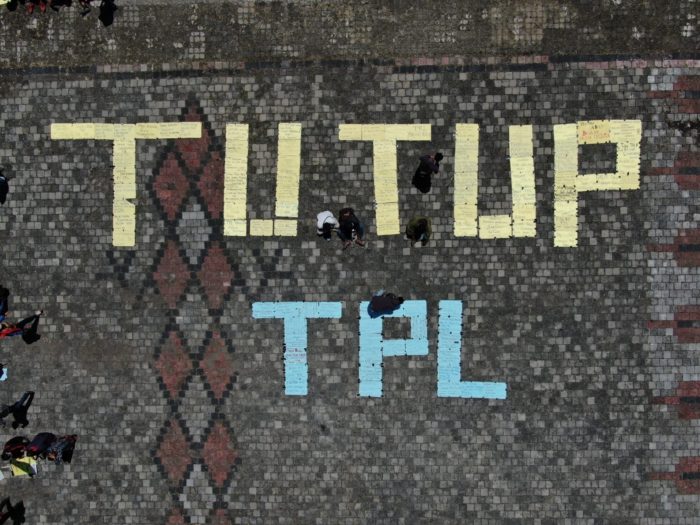
What’s happening?
Indigenous Batak Toba peoples native to North Sumatra, Indonesia, have been fighting pulp and paper company PT. Toba Pulp Lestari (TPL) – a notorious company which stole their land. The company is in the business of producing wood pulp, rayon fabric and more to make paper and cheap clothes. They produce these products by clearcutting rainforest and growing industrial monoculture plantations of pulp trees in their place. Many of these plantations are developed on Indigenous Batak Toba land without their consent, creating decades of land conflicts. According to local Indigenous rights organization KSPPM and AMAN Batak Toba, there are 23 Indigenous Batak Toba communities in conflict with TPL over 20,754 hectares of Indigenous land, roughly the size of the City of Oakland, California. A recent civil society investigation also alleged at least 28% or over 50,000 hectares of TPL’s concessions are in violation of Indonesian forestry zoning regulations [1].
Escalation over the past months
In May, the conflict escalated in one of the Indigenous communities, Natumika, as the company forcefully planted eucalyptus seedlings on their Indigenous land. The company came with tens of trucks carrying seedlings, 500 workers and accompanied by police and military personnel. To defend their land and livelihood, the community formed a blockade on the road but they were attacked by TPL employees with rocks and sticks. 12 community members were injured and the latest clash ignited a resurgent rise against TPL. (The video in this tweet shows the impressive scale of the protest.)
According to legal aid organization BAKUMSU, there have been nine incidents of violence and arbitrary arrests of Indigenous Batak Toba peoples and over 90 community activists criminalized since 1998 when the company was under a different name, PT. Inti Indorayon Utama, until now [2].
These 23 Indigenous communities have formed a broad alliance of civil society groups. Together they demand TPL to be shut down and that land is returned to Indigenous Batak Toba communities.
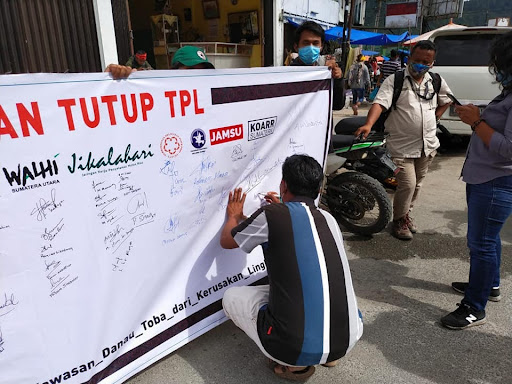
Communities fighting back: Movement Alliance to shut down TPL
The recent violent attack against Indigenous Batak Toba peoples triggered a national resurgence to defend Indigenous peoples and their land across Indonesia. For the past two months, hundreds of people protested local governments from districts in Balige, Tapanuli Utara, Toba, and Humbang Hasundutan to ministry buildings in the capital of Jakarta to support the community’s call to shut down TPL. Students and other communities self-organized their own actions by blockading TPL trucks.
In June, public pressure from communities and the Alliance resulted in a meeting between seven Indigenous Batak Toba representatives with the Indonesian Minister of Forestry and Environment, Siti Nurbaya Bakar, and her team where they demanded for the recognition of Indigenous Batak Toba lands, revocation of TPL’s license to operate, and to review policies impacting Indigenous Peoples.
In the same month, a team of 11 people led by three Batak activists, Togu Simorangkir, Anita Hutagalung and Irwandi Sirait, embarked on a 1,758 kilometer (1,902 miles) foot march from Toba to Jakarta, to demand Indonesian president Jokowi to shut down TPL and revoke its license to operate. The activists walked for 44 days, meeting other communities in conflict along the way, and have just arrived in Jakarta this week. And on July 7th, 750 Indigenous Batak communities and farmers marched to government offices in the District of Tapanuli Utara, North to protest against TPL. (Source: AMAN Tano Batak)
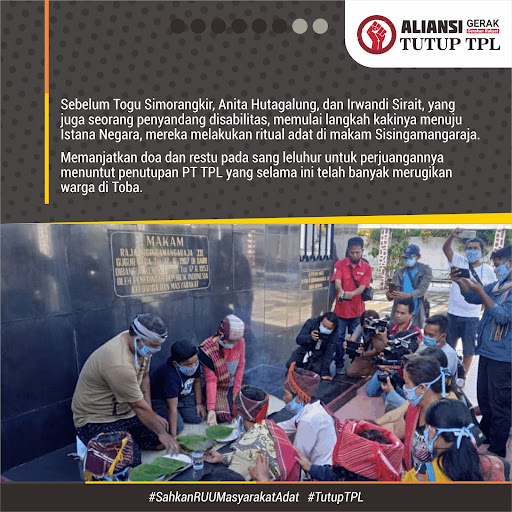
Stand in solidarity
Indigenous peoples globally are the most affected by climate change while contributing the least to the climate crisis. We are indebted to their deep knowledge and practice of living with nature, which has kept forests and many other ecosystems healthy for the benefit of everyone on the planet. These ecosystems are massive carbon sinks providing clean air and water to every living being – they are our best line of defense against climate change.
From Anishinaabe peoples fighting Line 3 to Batak Toba peoples fighting TPL, Indigenous communities are in movement to defend the Earth. Standing in solidarity with Indigenous peoples everywhere is our most effective way to combat climate change.
Here are ways for you to plug in and stand in solidarity with the Movement Alliance to Shutdown TPL:
1. Spread the word and amplify their calls by following these accounts on social media and reposting to amplify their calls:
- IG @aliansigeraktutuptpl
- IG @rumah.aman
- IG @amantanobatak
- Twitter: @RumahAMAN
- Twitter: @savetoba
- Use the hashtags: #TutupTPL (#ShutdownTPL)
2. Sign their petition
Sign this petition to support the Alliance’s call to Indonesian president Jokowi to shutdown TPL.
3. Follow the long march to Jakarta
Follow Togu, Anita and other activists embarking on the long march to Jakarta on social media and leave a message of solidarity.
Togu’s Facebook and Instagram
Anita’s Facebook
4. Online photo action
Use this photo filter, post, and tag the above accounts and hashtag.
5. Donate to the movement (only available via Indonesian bank transfers – see details here)
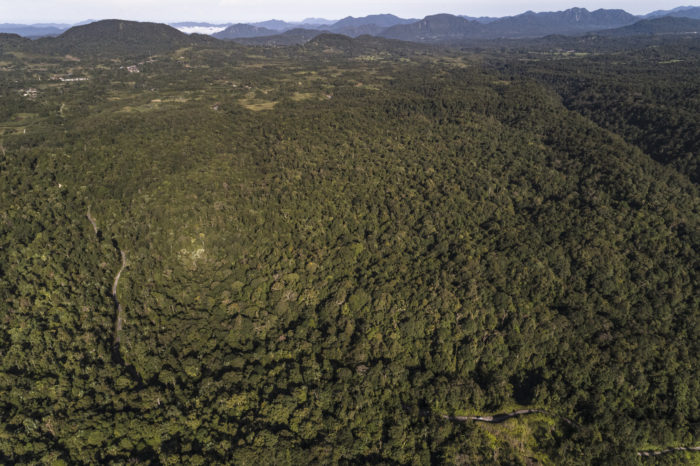
Footnotes (Sources):
[1] Aliansi Gerak Tutup TPL. “Kuasa Illegal PT TPL di Kawasan Danau Toba: Temuan investigasi, bukan saja kerap melakukan kekerasan, ternyata izin PT Toba Pulp Lestari (TPL) illegal”. Jikalahari. July 2021. http://jikalahari.or.id/wp-content/uploads/2021/07/Kuasa-Ilegal-PT-TPL-di-Kawasan-Danau-Toba-1.pdf
[2] Sihotang, et al. “Potret Buram PT TPL di Kawasan Danau Toba: Kekerasan, Kriminalisasi dan Diskriminasi Hukum”. BAKUMSU. July 2021.
